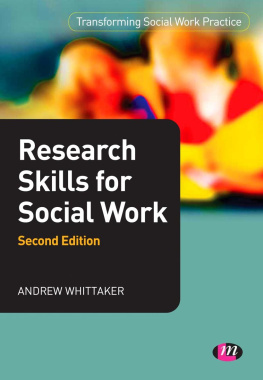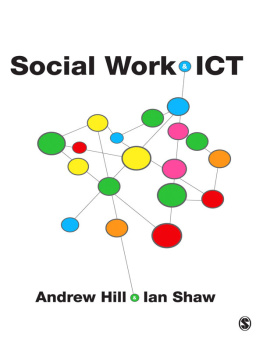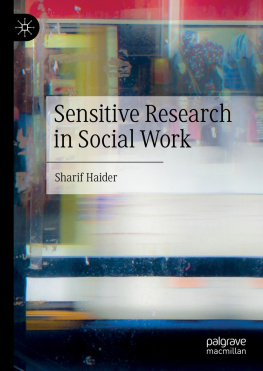Research Skills
for Social Work
Research Skills
for Social Work
Second edition
ANDREW WHITTAKER
Series Editors: Jonathan Parker and Greta Bradley
Learning Matters
An imprint of SAGE Publications Ltd
1 Olivers Yard
55 City Road
London EC1Y 1SP
SAGE Publications Inc.
2455 Teller Road
Thousand Oaks, California 91320
SAGE Publications India Pvt Ltd
B1/I 1 Mohan Cooperative Industrial Area
Mathura Road
New Delhi 110 044
SAGE Asia-Pacific Pte Ltd
3 Church Street
#10-04 Samsung Hub
Singapore 049483
Editor: Luke Block
Production controller: Chris Marke
Project management: Deer Park Productions
Marketing manager: Tamara Navaratnam
Cover design: Code 5 Design Associates
Typeset by: PDQ Typesetting Ltd
Printed and bound in Great Britain by: MPG
Books Group, Bodmin, Cornwall
2012 Andrew Whittaker
First published in 2009 by Learning Matters Ltd
Second edition published in 2012
Apart from any fair dealing for the purposes of research or private study, or criticism or review, as permitted under the Copyright, Designs and Patents Act, 1988, this publication may be reproduced, stored or transmitted in any form, or by any means, only with the prior permission in writing of the publishers, or in the case of reprographic reproduction, in accordance with the terms of licences issued by the Copyright Licensing Agency. Enquiries concerning reproduction outside those terms should be sent to the publishers.
Library of Congress Control Number:
2012936247
British Library Cataloguing in Publication data
A catalogue record for this book is available from the British Library
ISBN 978 1 44625 706 7
ISBN 978 0 85725 927 1 (pbk)
Contents
Acknowledgements
I would like to sincerely thank my many supportive colleagues at London South Bank University, including Annabel Goodyer, Iain Campbell-King, Martyn Higgins, Andrea Colquhoun, John Macdonough, Tirion Havard, Claire Felix, Rohan Burke, Jill Yates, Mary Saunders, Tom Wilks, Jo Rawles, Keith Popple, Rose Stark, Carl Chandra, Michelle Evans, Wijaya Mallikaaratchi, Ruth Watson and Liz Green. I would also like to thank current and past BA and MSc students for their helpful comments and suggestions.
My colleagues at the Centre for Social Work Research at the Tavistock Clinic and UEL have been a source of warmth and wisdom, particularly Stephen Briggs, Hannah Linford, Agnes Bryan, Andrew Cooper, David Lawlor, Alice Sampson, Anna Harvey, Tony McCaffrey, Adi Steiner, Helen Hingley-Jones, Jo Finch, Dawn Ludick, Simone Silverstein, Lorraine Ainscow, Chris Smart and Elaine Ryan. I would also like to thank new colleagues, Vicky Lidchi, Patricia Crittenden, Steve Bamborough, Mike Shaw, Mac Mays, Alexandra Marinou, Tim Kent, Steve Farnfield and all at the Monroe Family Assessment Service. I have appreciated the support of staff at Learning Matters, particularly Luke Block, Helen Fairlie and Jonathan Parker who have been very helpful and encouraging.
I would like to thank my mother, Christine, who has always been encouraging despite recovering from major health problems with the kind and constant support of Barrie. My father Ian and stepmother Vivien continue to be supportive and my sister Sally and her family, Joe, Lauren-Kate and Ben remain a loyal source of encouragement from across the pond.
My stepdaughters, Samantha and Rebecca, have got used to my constant trips to the British Library but fear (or perhaps hope) that I am really writing a novel in which they play a starring role, while Lily and Johnny remain as bemused as ever. Above all, I would like to express my genuine thanks to Christina for all the love and support that I could ever hope for. I hope for a long and healthy life together to be able to repay her, eventually.
Introduction
This book is written for student social workers who are developing the knowledge and skills to complete the research component of their course. While it is primarily aimed at students in their final year or level of study on an undergraduate degree, it will also be useful for students on postgraduate qualifying courses who have a research component. The book will also appeal to people considering a career in social work or social care but not yet studying for a social work degree. It will assist students undertaking a range of social and health care courses in further education. Nurses, occupational therapists and other health and social care professionals will be able to gain an insight into the new requirements demanded of social workers. Experienced and qualified social workers, especially those undertaking post-qualifying training, will also be able to use this book for consultation, teaching and revision and to gain an insight into the expectations raised by the qualifying degree in social work.
Requirements for social work education
Over the past decade social work education has undergone major transformations to ensure that qualified social workers are educated to honours degree level and develop knowledge, skills and values which are common and shared. A vision for social work operating in complex human situations has been adopted. This reflects the global definition of social work from the International Association of Schools of Social Work and International Federation of Social Workers (2001):
The social work profession promotes social change, problem solving in human relationships and the empowerment and liberation of people to enhance well-being.
Utilising theories of human behaviour and social systems, social work intervenes at the points where people interact with their environments.
Principles of human rights and social justice are fundamental to social work.
While there is a great deal packed into this short and pithy definition it encapsulates the notion that social work concerns individual people and wider society. Social workers practise with people who are vulnerable, who are struggling in some way to participate fully in society. Social workers walk that tightrope between the margin-alised individual and the social and political environment that may have contributed to their marginalisation.
Social workers need to be highly skilled and knowledgeable to work effectively in this context. In order to improve the quality of both these aspects of professional social work, the development of the social work degree creates a demand that you, as a student social worker, develop a rigorous grounding in and understanding of theories and models for social work. Such knowledge helps social workers to know what to do, when to do it and how to do it, while recognising that social work is a complex activity with no absolute rights and wrongs of practice for each situation. The emphasis at that point was on the application of research to inform social work practice:
Social work is a very practical job. It is about protecting people and changing their lives, not about being able to give a fluent and theoretical explanation of why they got into difficulties in the first place. New degree courses must ensure that theory and research directly informs and supports practice.
















